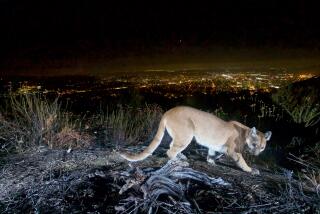Mountain lion kittens born in Santa Monica Mountains, father still unknown
- Share via
Two new mountain lion kittens born recently in the Santa Monica Mountains are attracting celebritylike attention -- and speculation about who fathered them.
The female and male kittens, now known as P-46 and P-47, were discovered in December in a well-hidden den in a remote area of the western end of the mountains, the National Park Service said. Both have been implanted with tracking devices to monitor their whereabouts.
The park service has been studying the mountain lions in and around the Santa Monica Mountains since 2002, providing a detailed look inside the animals’ activities -- and turning the adorable kittens especially into instant favorites on the Internet.
“We continue to see successful reproduction, which indicates that the quality of the natural habitat is high for such a relatively urbanized area,” Jeff Sikich, a biologist for Santa Monica Mountains National Recreation Area, said in a statement.
But what remains a mystery is who fathered the kittens, who were born early last month. The mother, P-19, had two previous litters as the result of inbreeding with her father, P-12. The last known activity associated with P-12 dates to March 2015.

DNA testing is underway to determine whether the new litter was also fathered by P-12, or perhaps a newly discovered adult male known as P-45. The new male has been tracked since Nov. 21 and has spent most of his time in the western end of the mountains.
It is unknown how P-45 ended up in the area and how he might be related to the other lions. Sikich is hopeful that the kittens’ father is unrelated to P-19, as inbreeding has been a problem for lions in the Santa Monicas, where the population is “essentially trapped,” the park service said.
Inbreeding leads to low genetic diversity, which can eventually lead to low reproduction, Sikich said.
“Our mountain lions in the Santa Monica Mountains ... have the lowest genetic diversity ever recorded of any mountain lion population besides the Florida panther that went nearly extinct,” Sikich said.
A proposed wildlife crossing over the 101 Freeway in Agoura Hills would connect large swaths of natural land from the Santa Monica Mountains to the Sierra Madre, which could help solve the genetic diversity problem.
On Thursday, the National Park Service posted a video of the kittens squeaking in their den while their mother was away, and another video featuring the kittens and their mother. The den was hidden among large boulders and thick brush.

P-19 has been tracked since 2010, when she was only a few weeks old. Of her last litter of kittens -- named P-32, P-33, P-34 -- two are dead.
This is the ninth litter of kittens marked by park service biologists at a Santa Monica Mountains den site. Two additional litters were discovered when the kittens were already at least 6 months old.
The kittens, Sikich said, have “many challenges ahead of them,” including evading other mountain lions, crossing freeways and dealing with exposure to rat poison.
“Young kittens, a big challenge for them is avoiding any adult male,” Sikich said. “Adult male lions have been known to kill young kittens.”
Follow me on Twitter @brittny_mejia
ALSO
Huntington Beach shelter improperly charged sales tax on pet adoptions, audit finds
Name changes for Ahwahnee Hotel and other Yosemite attractions draw outrage
Laguna Beach votes to continue trapping coyotes
More to Read
Sign up for Essential California
The most important California stories and recommendations in your inbox every morning.
You may occasionally receive promotional content from the Los Angeles Times.











